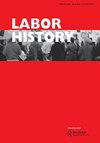British trade unionism in the 1980s reassessed. are recurring assumptions about union membership and strikes flawed?
IF 0.7
4区 管理学
Q1 HISTORY
引用次数: 0
Abstract
ABSTRACT This article questions the hypothesis, put forward by several historians and IR academics, that the 1980s decline in British union membership and strike frequency, was driven by major industrial defeats, a cultural shift away from collectivism, and the adverse effects of the Conservative Government’s anti-union legislation. In contrast, this paper argues that international economic developments, most notably the globalisation of manufacturing production, along with the British Conservative Government’s economic policies, which resulted in mass unemployment in heavily unionised areas of the economy, were the principal reasons for the declines in union membership and strike frequency during the 1980s. In support of this theory, my article draws upon extensive contemporaneous research, which I conducted when I worked in the Industrial Relations Research Unit at the University of Warwick in the late 1980s. This research illustrates how strike frequency and union membership fell in the early and mid-1980s, before membership stabilized, and the frequency of strikes relative to the number of unionised workplaces increased, during the short-lived economic upturn of the late 1980s.20世纪80年代,英国工会主义得到了重新评估。反复出现的关于工会成员和罢工的假设有缺陷吗?
摘要本文对几位历史学家和IR学者提出的假说提出质疑,即20世纪80年代英国工会成员和罢工频率的下降是由重大工业失败、从集体主义的文化转变以及保守党政府反工会立法的不利影响所驱动的。相比之下,本文认为,国际经济发展,尤其是制造业生产的全球化,以及英国保守党政府的经济政策,导致经济中工会密集地区的大规模失业,是20世纪80年代工会成员和罢工频率下降的主要原因。为了支持这一理论,我的文章借鉴了我20世纪80年代末在华威大学劳资关系研究室工作时进行的广泛的同期研究。这项研究表明,在20世纪80年代初和中期,在会员稳定之前,罢工频率和工会会员人数是如何下降的,而在80年代末短暂的经济好转期间,罢工频率相对于工会工作场所的数量是如何增加的。
本文章由计算机程序翻译,如有差异,请以英文原文为准。
求助全文
约1分钟内获得全文
求助全文
来源期刊

Labor History
Multiple-
CiteScore
1.00
自引率
28.60%
发文量
44
期刊介绍:
Labor History is the pre-eminent journal for historical scholarship on labor. It is thoroughly ecumenical in its approach and showcases the work of labor historians, industrial relations scholars, labor economists, political scientists, sociologists, social movement theorists, business scholars and all others who write about labor issues. Labor History is also committed to geographical and chronological breadth. It publishes work on labor in the US and all other areas of the world. It is concerned with questions of labor in every time period, from the eighteenth century to contemporary events. Labor History provides a forum for all labor scholars, thus helping to bind together a large but fragmented area of study. By embracing all disciplines, time frames and locales, Labor History is the flagship journal of the entire field. All research articles published in the journal have undergone rigorous peer review, based on initial editor screening and refereeing by at least two anonymous referees.
 求助内容:
求助内容: 应助结果提醒方式:
应助结果提醒方式:


